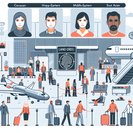
In a major setback for thousands of foreign professionals and their U.S. employers, the Department of Homeland Security (DHS) on 29 October published an interim final rule eliminating the automatic extension of Employment Authorization Documents (EADs) that had been available to many renewal applicants since 2022.
Under the previous regulation, qualified foreign nationals—including adjustment-of-status applicants, H-4 and L-2 dependent spouses, asylum applicants, and several humanitarian categories—received up to 540 days of continued work permission simply by filing a timely EAD-renewal application. DHS now says the grace period created “unacceptable security and vetting gaps.” Beginning 30 October 2025, anyone who files an EAD renewal will lose work authorization the day after the card’s printed expiration date unless USCIS issues the new card first or the individual has another independent basis for employment (for example, an unexpired I-94 in a work-authorized classification).
The rule does not affect automatic extensions already granted, nor does it change the separate 180-day extension regime linked to Temporary Protected Status or the 180-day STEM-OPT extension for F-1 students. Nevertheless, the policy will force tens of thousands of employees and their companies to rethink renewal timing; immigration counsel are advising clients to file renewals 6–12 months in advance and to develop contingency staffing plans for any lapse in authorization.
Human-resources departments must also revise I-9 procedures. Previously, a receipt notice plus an expired EAD sufficed for List A documentation; from 30 October forward, HR may no longer accept that combination for new I-9s or reverifications. Companies that rely heavily on H-4, L-2, adjustment-of-status or asylum-pending talent—particularly in IT, health-care and hospitality—face the prospect of unplanned work stoppages, administrative leave or layoffs if adjudications lag.
Practical steps for employers include setting up automated reminders 12 months before card expiry, budgeting for premium-processing upgrades where available, and coordinating furlough or paid-time-off strategies should a gap occur. Foreign nationals are being urged to track personal EAD dates, file at the earliest permissible moment, and discuss alternative visa strategies (for example, moving from H-4 EAD to H-1B if eligible). Litigation and congressional scrutiny are expected, but for now the change takes immediate effect, marking one of the most significant rollbacks of employment-based immigration flexibility in the post-pandemic era.
Under the previous regulation, qualified foreign nationals—including adjustment-of-status applicants, H-4 and L-2 dependent spouses, asylum applicants, and several humanitarian categories—received up to 540 days of continued work permission simply by filing a timely EAD-renewal application. DHS now says the grace period created “unacceptable security and vetting gaps.” Beginning 30 October 2025, anyone who files an EAD renewal will lose work authorization the day after the card’s printed expiration date unless USCIS issues the new card first or the individual has another independent basis for employment (for example, an unexpired I-94 in a work-authorized classification).
The rule does not affect automatic extensions already granted, nor does it change the separate 180-day extension regime linked to Temporary Protected Status or the 180-day STEM-OPT extension for F-1 students. Nevertheless, the policy will force tens of thousands of employees and their companies to rethink renewal timing; immigration counsel are advising clients to file renewals 6–12 months in advance and to develop contingency staffing plans for any lapse in authorization.
Human-resources departments must also revise I-9 procedures. Previously, a receipt notice plus an expired EAD sufficed for List A documentation; from 30 October forward, HR may no longer accept that combination for new I-9s or reverifications. Companies that rely heavily on H-4, L-2, adjustment-of-status or asylum-pending talent—particularly in IT, health-care and hospitality—face the prospect of unplanned work stoppages, administrative leave or layoffs if adjudications lag.
Practical steps for employers include setting up automated reminders 12 months before card expiry, budgeting for premium-processing upgrades where available, and coordinating furlough or paid-time-off strategies should a gap occur. Foreign nationals are being urged to track personal EAD dates, file at the earliest permissible moment, and discuss alternative visa strategies (for example, moving from H-4 EAD to H-1B if eligible). Litigation and congressional scrutiny are expected, but for now the change takes immediate effect, marking one of the most significant rollbacks of employment-based immigration flexibility in the post-pandemic era.








